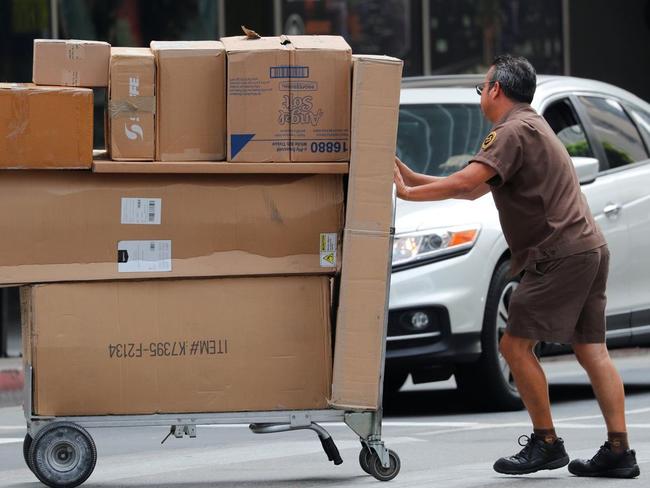Online shoppers warned of ‘longer than usual delays’ due to virus as Amazon, FedEx cope with increased demand
Australians are turning to online shopping amid the coronavirus outbreak but they’re being warned to expect long delays.
Retail
Don't miss out on the headlines from Retail. Followed categories will be added to My News.
Online shoppers frantically buying from overseas sites are being warned that they could face delays to receive their orders in the wake of coronavirus.
As Australian consumers turn to eBay, Amazon and other sites to cope with the retail downturn and disruption, international sites and their delivery services are warning of “longer than usual” delays.
FedEx – a global delivery service based in the United States and distributing globally to 220 countries and territories – said it was still shipping, but working to “adjusted delivery commitments”.
“These work and travel restrictions may affect shipments to and from impacted areas, as well as shipments moving within those areas,” FedEx said in a statement.
“We have adjusted delivery commitments for certain impacted areas.”

FedEx is “operating to and within impacted areas as local conditions and restrictions allow”, it said, while “adhering to all regulations and guidelines from government authorities related to containment of the virus”.
E-commerce platform Amazon has reported a spike in online shopping demand, causing “longer than usual” delivery times. It has also taken drastic measures to stop sellers from cashing in on virus-related panic buying, removing 2,500 US sellers for breaches to its policy, CNN reported.
The $US1 trillion business has also sold out of some key brands and household products as consumers flood the site with orders.
“In particular, you will notice that we are currently out of stock on some popular brands and items, especially in household staples categories,” Amazon said in a statement.
“We are working around the clock with our selling partners to ensure availability on all of our products, and bring on additional capacity to deliver all of your orders.”
United Parcel Service (UPS) – the American package delivery company – said it had also resumed services, including to mainland China (except Wuhan City).
MORE NEWS
Myer, David Jones’ plea to boost retail amid lockdown
Lewis Hamilton reveals Aussie heartbreak
Met Gala cancelled amid coronavirus outbreak

It comes as Australian brands are being forced to take drastic measures in a bid to remain open amid growing coronavirus concerns.
As calls for self-isolation and social distancing increase, the demand for online shopping is growing exponentially.
In Australia, David Shafer, executive director of Kogan.com, said the Australian e-store – specialising in consumer electronics, TVs and home appliances – was shipping “as per normal”.
Mr Shafer said Kogan had “months of stock” levels in its warehouse, while its supply chain in China was “just kicking back into gear”.
Popular online fashion retailer The Iconic has noted no to online orders, same with Myer, despite the increase in demand for internet shopping.
The Iconic said it was experiencing “limited” delays in receiving stock from external suppliers.
Australia Post said there were “international delivery delays” because of COVID-19.
“We are working with partner airlines and other postal operators to move items as quickly as possible,” it said in a statement.
Australia Post has also introduced strict new measures to deal a surge in internet shopping. It said deliveries would no longer require a signature “to minimise the risk of contracting or spreading coronavirus”.
“In all cases, whether a driver or postie delivers to the door or a customer goes in to their local Post Office to collect a parcel, an Australia Post staff member will ask and record the customer’s name and sign on their behalf,” Australia Post said in a statement.
“The customer will still need to be present for this to occur, but contact will be minimised.”
Originally published as Online shoppers warned of ‘longer than usual delays’ due to virus as Amazon, FedEx cope with increased demand


